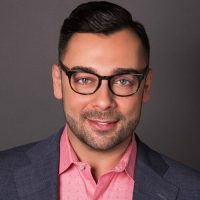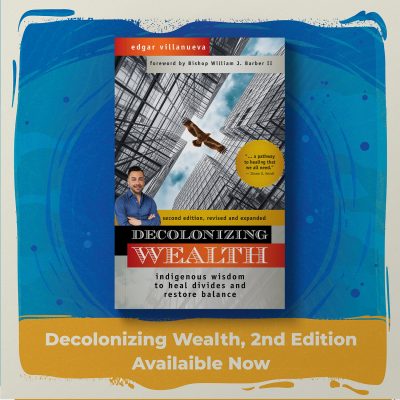Author and activist Edgar Villanueva to speak at Gillings School’s 2022 Commencement
February 18, 2022

Edgar Villanueva
Edgar Villanueva, MHA, is an award-winning author, activist and expert on issues of race, wealth and philanthropy. He holds bachelor’s and master’s degrees from the UNC Gillings School of Global Public Health and is an enrolled member of the Lumbee Tribe.
“We need healing across this country today, now more than ever before. One thing we believe in Indigenous communities is that the oppressor has to be at the table for healing to take place,” he says, which is a philosophy he expands upon in his bestselling book Decolonizing Wealth. This means, “that we all hold a role in the process of healing.”
At the Gillings School’s 2022 Commencement celebration on May 7, Villanueva will offer insights from his experiences as the founder of the Decolonizing Wealth Project and its fund, Liberated Capital.
“I began my journey as a Native American person growing up in North Carolina from a community with little wealth,” he shares. “After finishing graduate school, I took a foundation job that gave me insight into the world of the financial elite. I learned how a small number of people control massive amounts of wealth and resources — and also set the tone for the work of the entire nonprofit sector.”
As he became more aware of the tensions within the philanthropic sector, including a noticeable lack of diversity, Villanueva paid attention to how financial capital moves through communities. His top takeaway was that systemic racism, baked into the United States economic system from the beginning, still causes a lack of investment in communities of color.
“The work of the Decolonizing Wealth Project is to help those with wealth, be it money or resources like the information held in libraries, or storytelling platforms in Hollywood, to understand the dynamics behind how they give to others,” he says. “We work to educate and engage leaders, we share tools with them, and we’ve already redistributed nearly $10 million in unrestricted capital to Black, Indigenous and other people-of-color communities. We’re shifting the narrative of the $1 trillion philanthropic industry away from a ‘charity orientation’ between the ‘haves’ and the ‘have-nots’ — who have historically had to beg for funding — to a new dynamic of using money in a sacred way, as a form of reparations.
To this end, Villanueva advises Fortune 500 companies, national and global philanthropies, and entertainment companies on social impact strategies that advance racial equity both from within and through their investment strategies.
“We created the system we have,” he says. “That means we can change it. We all have the chance to think through where our money comes from and how we spend, save, invest or donate it. I like to ask people to recognize their role in a future where we all thrive. We don’t have to be wealthy to become activists and healers in the circles we’re part of.”
When Villanueva completed his Gillings School Master of Healthcare Administration program in 2005, he planned to one day run a hospital or community health center.
“My focus shifted, though, based on what I was exposed to at the school of public health. UNC offered my first experience with a more diverse, international population,” he recalls. “I learned that poverty is a product of public policy. At Gillings, I came to understand that any solution lacking an analysis of geography and race will be less effective.”
During the COVID-19 pandemic, Villanueva’s organizations raised more than $1 million to make direct cash payments to Native American families who were struggling. Of that, $500,000 went to members of the Lumbee Tribe.
He says the best feeling of all is when your own community and family are proud of your work — and yes, his mom will be in the audience when he delivers the 2022 Commencement speech.
“I hope to inspire graduates to be open to unexpected callings,” Villanueva says. “Walk through the doors that open. I didn’t expect this to be my life, but I can tell you there is no happier place than being right smack in the middle of living your true calling.”
Contact the UNC Gillings School of Global Public Health communications team at sphcomm@unc.edu.

